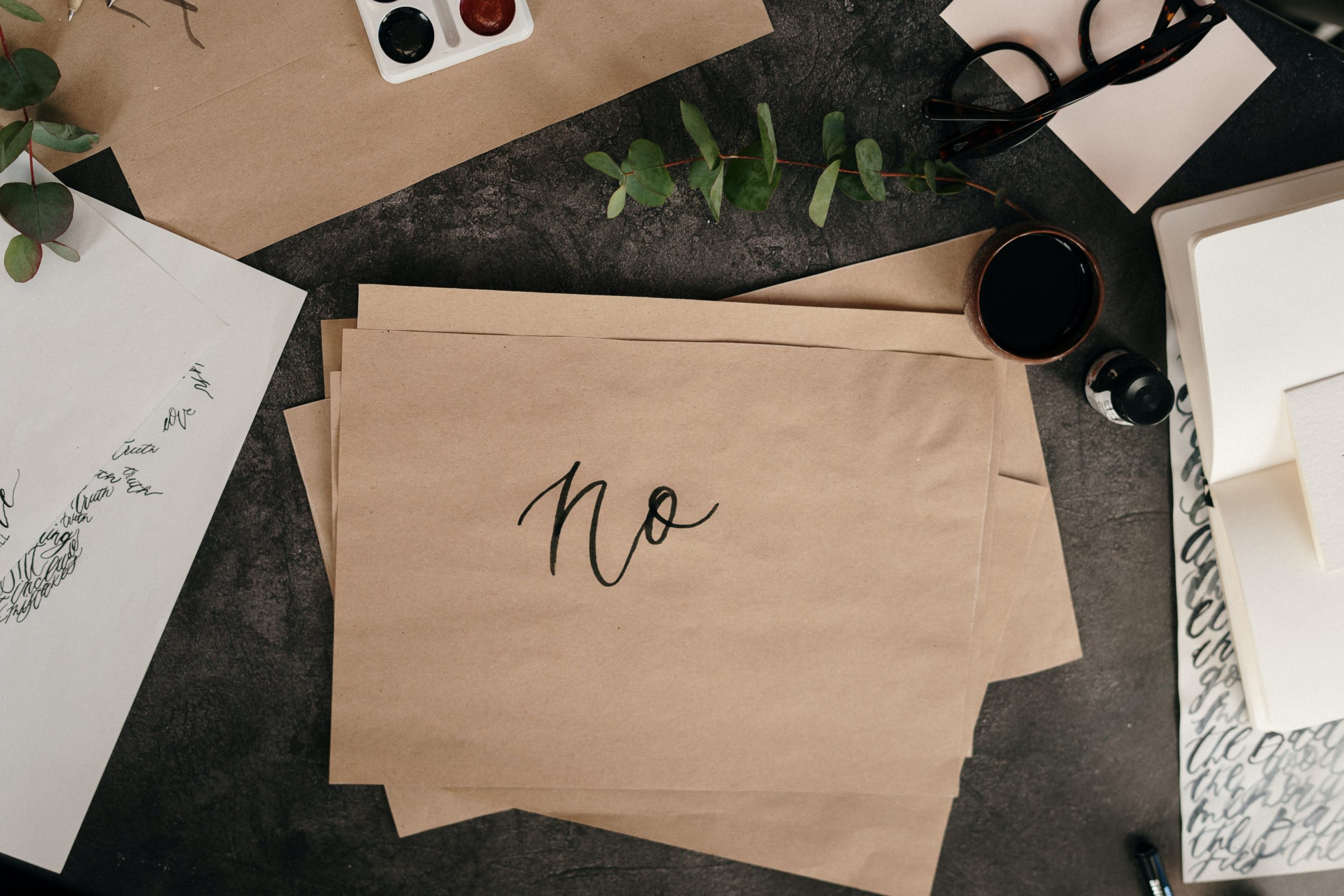No Is A Magic Word
The word “please” has a long history of being amagic word, along with its buddies “thank” and “you”. These words infuse a sentence with politeness, gratitude and relay to the person receiving our message that we have manners and often softens them to whatever came before or after these words.
I’m not here to talk about those words, they’ve had their time to shine and they get enough spotlights on Sesame Street.
This is a word that is magic for the speaker instead of the receiver. A word that should come in response to, “Hi, can you do me a favour even though you already have plans or need a break or have 100 other things you should be doing?”
Repeat after me: “No.”
Stop right there! I see you trying to add other words. It’s not, “No…I’m not feeling well,” or “No, my dog ate my work and I have to do it over then spend his last few days with him since it made him incurably sick.” “No.” is a complete sentence.
The word is often one of the first ones we learn to speak, ask any toddler – it’s a favourite of theirs. “Eat your vegetables” – No, “Get ready for school” – No, “I’m going to give you a bath” – No.
Where did we go wrong?
Agreeing to everything often leaves us at the mercy of others and without boundaries. This eventually affects us mentally and even physically.
Most sources define this reluctance to say no as people pleasing, which generally has roots in a person’s upbringing.
Patricia Williams, Editor of The Conscious Way says, “If, as a child, your parent(s) only showed love when you were conforming to their needs, desires and expectations, you’ll eventually learn that you need to please them in order to be truly loved and accepted — and you’ll unconsciously apply that belief to every human interaction.”
Instead of, or in addition to, being showed love when conforming to their needs, you may have also been shamed when you did not conform, and this can present itself as a feeling of guilt attached to not meeting the expectations of those around you.
This habit can also be a response to any kind of trauma or unpleasant experience from our past that we are trying to avoid moving forward.
For example, I often say yes to every activity my friends ask me to do with them because growing up I had painful periods of time where I had no one to do anything with. I experienced loneliness that was impactful enough for my behaviour to change so that I could prevent that feeling from happening again. I found myself thinking that if I said refused sometimes, or too many times in succession, I would stop being asked or invited to do things. What if I missed out and got excluded from “the circle”? What if I’m all alone again?
Even as I write this, I wonder if I’ll lose the title of “the friend that always shows up” because my friends will read this and realise I was doing so because I was afraid of losing them.
But – the ones that value my friendship in earnest will understand or will communicate with me about it if they have thoughts and feelings.
Of course, this does not just apply to personal relationships, it can be professional as well. Such as – taking every job interview that comes our way even if we don’t want it or taking every extra task that passes by our desks for fear that the opportunities we DO want won’t come if we refuse the ones that are available.
We’re beginning to see why saying “no” can be hard, but how can it be valuable?
It helps us set boundaries. Boundaries help people learn how to interact with us in a way that we need or want.
Mariana Bockarova Ph.D. defines boundaries as, “the limits we set with other people, which indicate what we find acceptable and unacceptable in their behavior towards us.”
She explains that, “The ability to know our boundaries generally comes from a healthy sense of self-worth, or valuing yourself in a way that is not contingent on other people or the feelings they have toward you. Unlike self-esteem (which some research has found to be strongly related to the relatively fixed personality dimensions of high extraversion and low neuroticism), self-worth is finding intrinsic value in who you are.”
Our boundaries help us establish, enforce, and maintain a healthy relationship with ourselves and this often leads to healthy, balanced relationships with others.
Saying “yes” to everything can make us resent the people around us. We could fall into habit of expecting from others what we expect from ourselves.
For example, you ask something of someone and they say no. You feel bitterness towards them. How could they refuse? You would do it for them without hesitation if they asked the same.
Let me tell you what one of my colleagues tells me any time I complain about anything ever – “That sounds like a ‘YOU’ problem”.
And it is. We imposed this requirement upon ourselves, it’s not anyone else’s issue.
No does not need an explanation. Of course, a blunt one-word answer is probably not the best for every situation, but don’t give away too much.
Explaining why you’re saying no to something puts the power in the hands of the person you are answering and gives people a chance to poke holes in your reasons – which can often weaken our resolve and make us change our answer to yes.
Saying no, setting boundaries and being the final say on how you spend your time is a form of self-care. We deserve the same effort for ourselves that we give to others. Maybe even more than that!
So practice a little magic every now and then. And to my friends reading this I say – please keep inviting me out, I’ll show up sometimes.
Works Cited
Bockarova, Mariana. “4 Ways to Set and Keep Your Personal Boundaries.” Psychology Today, Sussex Publishers, 2016, https://www.psychologytoday.com/us/blog/romantically-attached/201608/4-ways-set-and-keep-your-personal-boundaries.
Williams, Patricia. “This Is Why We Become People-Pleasers.” Medium, Be Unique, 12 Oct. 2021, https://medium.com/be-unique/this-is-why-we-become-people-pleasers-2d6c69da8d.










Leave a Reply
You must be logged in to post a comment.